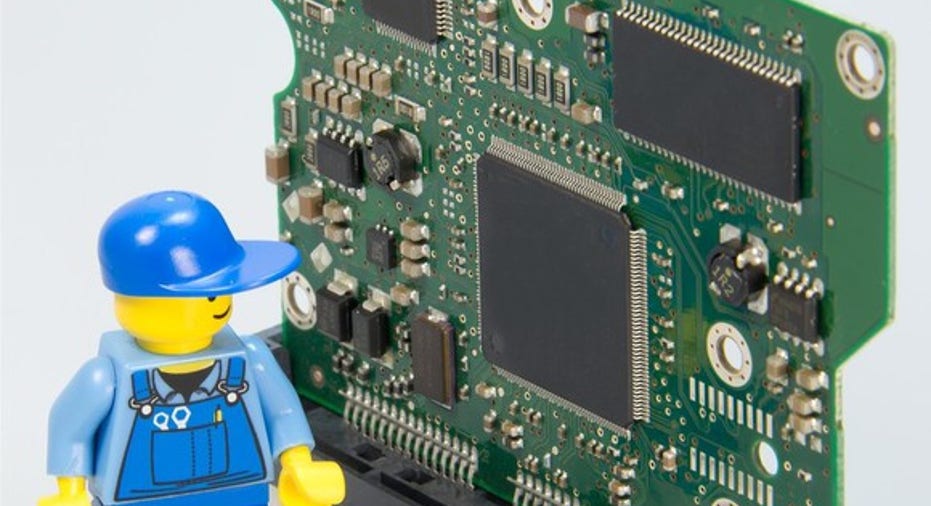Better Buy: Qualcomm Inc vs. Broadcom Ltd.

Qualcomm (NASDAQ: QCOM) and Broadcom (NASDAQ: AVGO) are two semiconductor giants that grew much larger through acquisitions over the past few years. But those acquisitions also dramatically altered the business models of both companies, and investors who haven't been following these chipmakers might be surprised by their new strategies.
Image source: Pixabay.
What do Qualcomm and Broadcom do?
Qualcomm, the largest mobile chipmaker in the world, generates most of its revenue from SoCs (system on chips), which combine application processors, GPUs, and baseband modems for smartphones and tablets. But its patent licensing business, which charges OEMs licensing fees for every 3G/4G device sold, generates the lion's share of its profits.
To offset slowing sales of smartphones and strengthen its patent portfolio, Qualcomm expanded into adjacent markets with big acquisitions, including wireless chipset maker Atheros in 2011, IoT (Internet of Things) chipmaker CSR in 2015, and its planned purchase of NXP Semiconductors, the biggest automotive chipmaker in the world.
Broadcom once competed against Qualcomm in the mobile application processor and baseband modem markets. But tough competition forced Broadcom to leave both markets and pivot toward radios for consumer devices and chips for data center networking equipment. Avago, a maker of analog and mixed-signal chips, acquired Broadcom earlier this year and assumed Broadcom's name.
The "new" Broadcom subsequently sold its IoT business toCypress Semiconductor (NASDAQ: CY), and recently announced its plans to buy networking equipment vendor Brocade (NASDAQ: BRCD). That deal will make Broadcom one of the three largest FC (fiber channel) equipment vendors in theworld alongside Cisco and Cavium.
Qualcomm's strengths and weaknesses
Qualcomm's chipmaking business faces several major headwinds -- slowing demand for smartphones worldwide, its loss of market share to cheaper rivals like MediaTek, and the development of first-party ARM chips by leading OEMs like Apple, Huawei, and Xiaomi.
Qualcomm's licensing business also faces defiant OEMs and regulators, which claim that its fees are too high compared to the low margins of the smartphone industry. It was already forced to lower those feesin China last year. Those pressures caused Qualcomm's revenue and earnings to respectively fall 7% and 5% last year.
However, Qualcomm's new high-end Snapdragon chips, its aggressive expansion into adjacent markets, and new licensing agreements with OEMs (especially in China) are expected to lift its revenue by 1% and earnings by 7% this year. Closing the NXP deal earlier would significantly boost those year-over-year comparisons.
Broadcom's strengths and weaknesses
Over 10% of Broadcom's revenue comes fromApple. Prior to merging, Avago supplied power amplifier modules for iPhones and iPads, while Broadcom supplied touchscreen controllers and combo-radios. This means that if sales Apple's iDevices continue falling, Broadcom's wireless business (27% of last quarter's revenues) could take a hit.
However, Broadcom estimates that the unit will post 30% sequential growth in the current quarter on the strength of its unnamed "North American smartphone customer" (most likely Apple). Meanwhile, Broadcom's wired infrastructure business (54% of revenues) will likely keep growing on robust demand forswitching, routing, and fiber optic solutions. Its industrial segment, which includes an IP licensing business, also posted double-digit annual sales growth last quarter.
Broadcom's softest spot is its enterprise storage business, which reported a 10% annual sales decline last quarter due to general weakness in the data storage market. But looking ahead, analysts expect Broadcom to post 94% sales growth this year (inflated by merging with Avago), and 23% growth in 2017. On the bottom line, Broadcom's earnings are expected to rise 25% this year and 20% next year.
Buybacks and dividends
Over the past 12 months, Qualcomm spent $3.3 billion on buybacks and $3 billion on dividends, compared to its free cash flow of $6.9 billion during that period. However, Qualcomm funded most of those buybacks with debt, and it's unclear howits $47 billion purchase of NXP will impact that strategy in the future. Qualcomm currently pays a forward dividend yield of 3.2%. It's likely to keep raising that dividend annually, as it has done so for the past 13 years.
Broadcom generated $2 billion in free cash flow over the past 12 months, but it spent just $272 million on buybacks and $653 million on dividends. It also pays a much lower forward yield of 1.2%. Broadcom has raised that dividend annually for the past six years.
The valuations and verdict
Qualcomm trades at 20 times earnings, which is slightly lower than the industry average of 22 for the broad line semiconductor companies. Broadcom's P/E is negative due to the costs of the merger, but it trades at 13 times forward earnings compared to Qualcomm's forward P/E of 14.
It's a close call between the two chipmakers, but I believe that Qualcomm's higher dividend, more generous buybacks, and its purchase of NXP put it in a better position to grow than Broadcom. However, Broadcom's well-diversified business, lower valuation, and solid top and bottom line growth still make it a solid long-term semiconductor play.
A secret billion-dollar stock opportunity The world's biggest tech company forgot to show you something, but a few Wall Street analysts and the Fool didn't miss a beat: There's a small company that's powering their brand-new gadgets and the coming revolution in technology. And we think its stock price has nearly unlimited room to run for early in-the-know investors! To be one of them, just click here.
Leo Sun owns shares of Cisco Systems and Qualcomm. The Motley Fool owns shares of and recommends Apple, NXP Semiconductors, and Qualcomm. The Motley Fool has the following options: long January 2018 $90 calls on Apple and short January 2018 $95 calls on Apple. The Motley Fool recommends Broadcom, Cisco Systems, and Cypress Semiconductor. Try any of our Foolish newsletter services free for 30 days. We Fools may not all hold the same opinions, but we all believe that considering a diverse range of insights makes us better investors. The Motley Fool has a disclosure policy.



















